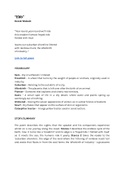“Ebb”
Derek Walcott
“Year round, year round we’ll ride
this treadmill whose frayed tide
fretted with mud
leaves our suburban shoreline littered
with rainbow muck, the afterbirth
of industry…”
Link to full poem
VOCABULARY
Sere - Dry or withered / crinkled.
Treadmill - A wheel that turns by the weight of people or animals, originally used in
industry.
Suburban - Relating to the outskirts of a city.
Afterbirth - The placenta that is left over after the birth of an animal.
Pioneer - Someone that explores and charts new territory.
Oasis - A small spot of life in a dry desert, where water and plants spring up
seemingly out of nothing.
Wickered - Having the woven appearance of wicker, as in wicker fences or baskets.
Scurf - Dry flakes that appear on the surface of skin or organisms.
Caterpillar tractor - A large yellow tractor used in construction.
STORY/SUMMARY
The poem describes the sights that the speaker and his companions experience
whilst on a car journey along the coast. Stanza 1 describes the endless cycle of the
Earth, how it turns like a ‘treadmill’ and its edge is a ‘frayed tide / fretted with mud’
as it meets the sea; the humans ride it yearly. Stanza 2 takes the reader to the
‘suburban shoreline’, the edge of the land where the ‘littering of rainbow muck’ (oil
and waste that floats in from the sea) forms the ‘afterbirth of industry’ - a gruesome
, image which suggests that the byproducts of rapid progress are toxic. In Stanza 3,
the car passes salt-crusted bungalows and a factory, the speaker is relieved when
they come to an idyllic clearing of coconut trees, although he remarks cynically that
this beautiful natural space too will soon be cleared by a Caterpillar tractor. In Stanza
5, the speaker notices a schooner through the ‘netted’ trees, which form a wicker
pattern of light and shadow. The boat looks as if it’s trapped ‘like a lamed heron’ or
‘oil-crippled gull’ (Stanza 6). In Stanza 7, the car moves out from the trees and the
image of the schooner finally breaks free into open water and ‘races the horizon’,
travelling fast across the sea in a straight line. The speaker of the poem travels
parallel to the ship along the land. Though they travel in the same direction, in
Stanza 9 the speaker observes that he and his companions ‘are bound elsewhere’ -
travelling to a different place. In Stanzas 10-11, he reflects further on the schooner
and how it is floating too far away; it turns into a vision of lost youth. The final two
stanzas (12-13) take a shift in tone, and become more philosophical and abstract -
the speaker observes that we mortgage ‘life to fear’, in other words we sacrifice true
and natural living in order to minimise the fear and difficulties of our daily lives. He
finally asks ‘why not?’, succumbing to the idea that he has no right to judge others
when he’s travelling and observing the world from the convenience and safety of his
car. From his modern perspective, even regular habits are terrifying enough, and
familiar experiences are like miracles - he can’t imagine being fully wild and natural
like our ancestors, how frightening it must have been.
SPEAKER/VOICE
The poem is predominantly told in first person plural, shifting at the end to
first-person by the tenth stanza - ‘sometimes I turn to see’. The reasoning behind this
is perhaps that the speaker is holding ‘us’, the reader, accountable for the folly and
greed of industrialisation - he seems to be talking about humans as a whole, and
how we interact with and adapt the world around us. The repetition of the plural
pronouns, ‘we’ and possessive pronoun ‘our’ further emphasise the sense of
humanity as a whole being responsible for industrialisation. In the tenth stanza, the
speaker plays on innocence, shifting to first-person, communicating that the
‘schooner’ has drifted ‘out too far’, that even in ‘boyhood’ it’s too late. The line,
‘sometimes I turn to see’ suggests the idea of looking back to the speaker’s
childhood, perhaps to a time when the world seemed more natural and less
overdeveloped. The final world ‘Sure... ‘ trails off using ellipsis, perhaps suggesting
that the speaker has no real solution to the problem, and that he feels helpless as he





